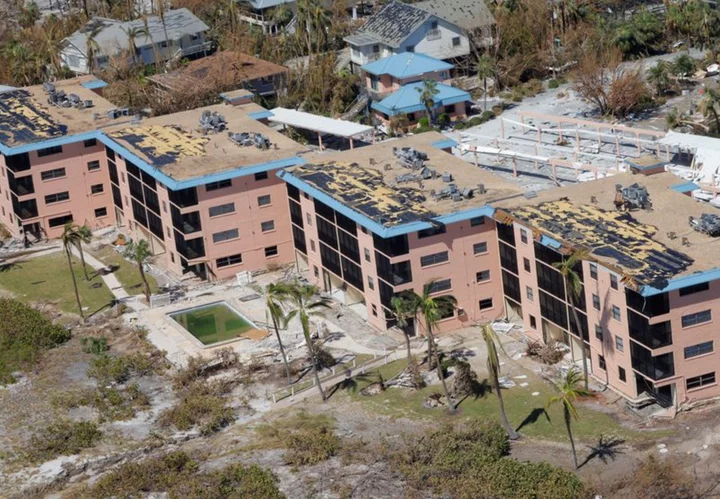By Matt Tracy
Hurricane Idalia is expected to increase insurance costs for Florida commercial real estate (CRE), particularly owners of apartments and other multifamily properties already grappling with soaring premiums driven by climate change, industry executives and analysts said.
Idalia on Wednesday plowed through Florida's Gulf Coast as a Category 3 storm, lashing the area with sustained winds of up to 125 mph (201 kph), accompanied by torrential rains and pounding surf, before heading north to the Carolinas.
The storm follows wildfires in Hawaii's island of Maui, the deadliest in the U.S. in more than a century, which burnt the resort town of Lahaina to the ground, leaving at least 115 people dead and hundreds missing.
Scientists say global warming is fueling such disasters and making hurricanes worse.
Ten industry executives and analysts said that in turn is pushing up insurance costs for commercial real estate developers in California and the southern coastal Sun Belt States, particularly Florida, which is hit by more hurricanes than any other state, according to U.S. government data.
This year, Florida commercial property insurance rates have climbed to 93 cents per $100, from 68 cents per $100 in 2022, according to estimates provided to Reuters by real estate investment firm Walker & Dunlop.
That 37% jump was driven in large part by last September's Hurricane Ian, the worst storm to hit the state in two decades, causing $53 billion of insured damages.
"The bottom line is the economics of climate change are coming into our business, and if you’re not focused on it, you’re missing something," said Willy Walker, CEO of Walker & Dunlop, one of the largest U.S. CRE lenders.
Costs have risen the most on multifamily properties such as apartments and condos, according to industry executives and data from credit ratings agency Moody's. That is because such buildings often have wood frames which are more prone to fires, and because high tenancy rates generate more claims.
In Florida, UBS expects Idalia to result in insured losses of $9.36 billion based on preliminary estimates, the brokerage said. Those losses will mainly arise from homeowners and commercial property lines, according to Moody's.
"Compared to other CRE asset classes, multifamily has half, if not a third the amount of insurers willing to underwrite the risk," said Ryan Barber, a managing director at Marsh, a leading insurance broker.
Florida multifamily property owners are bearing the greatest insurance cost increases of all states and asset classes in the U.S., according to Martha Bane, managing director of the property practice at Gallagher, a major insurance and reinsurance broker.
"Wood frame multifamily assets in Florida will be skewed in the impact from a financial standpoint," Bane said, referring to Idalia and the peak in hurricane season expected in September.
"They are most likely to suffer significant damage, already have high deductibles, and they are going to see elevated rate increases and just a general pullback in coverage."
Property insurance costs to multifamily assets in Florida have gone up anywhere from 30% to 70% in the past year, and are even higher for those with prior losses, non-renewing insurance carriers or valuation issues, she said.
Nationally, CRE properties' insurance costs have grown roughly 7.6% annually on average since 2017, according to an August Moody's report.
Some insurance firms have pulled out of Florida in recent years because of the risk of heavy losses.
RENTS, CAP RATES
Rising insurance premiums on multifamily properties have contributed, among other factors, to rent increases in Florida and elsewhere, said three industry executives.
Apartment rents have increased by over 20% on average since 2020, according to an August report by ratings agency KBRA. The Florida markets of Miami, Tampa and Orlando topped the list, each seeing hikes of over 33% from January 2020 to April 2023.
Insurance costs are also forcing CRE lenders to boost due diligence on refinancing and when pricing deals on apartment blocks, executives said.
For example, insurance costs are increasingly factoring into the so-called "cap rates" that CRE lenders use to assess the profitability of a prospective loan used to finance apartment blocks, which in turn affects the loan interest rate.
"When we're looking at cap rates in Florida right now on our sales, we do a pre-insurance/post-insurance cap rate adjustment," said Walker. "Insurance cost is a huge issue."
(Reporting by Matt Tracy; editing by Michelle Price and Marguerita Choy)









